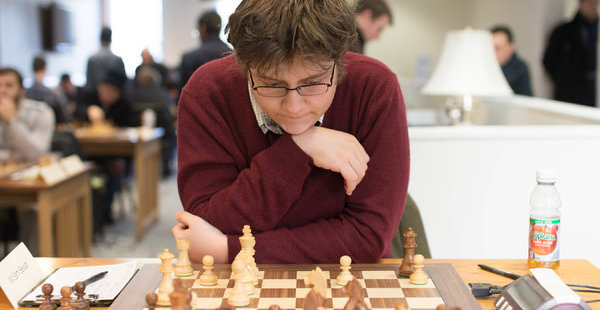

Several weeks had passed since the greatest moment in Sam Sevian’s chess life, enough time to allow for some quiet reflection. On a recent Sunday afternoon inside a Midtown Manhattan high-rise, where the teenage Sevian had been invited for a training session with the chess champion Garry Kasparov, he recalled a recent game with enormous stakes.
The tension Sevian felt during that Nov. 22 contest — “nerve-racking,” he called it — was brought on by the prize that awaited him if he won it.
Sevian was taking on Andrey Gorovets of Belarus in a fourth-round game at an invitational tournament in St. Louis. With a victory, Sevian — then 13 years 10 months 27 days old — would become the youngest grandmaster in United States history, by more than a year. In 2009, Ray Robson earned the title at 14 years 11 months 16 days.
Sevian had won his first three games of the tournament, but Gorovets was proving to be stiffer competition.
“I was on the attack,” Sevian said, but Gorovets “was defending really well.”
The game went back and forth for hours, and Sevian’s greatest difficulty seemed to be completing his moves in the time allotted. At one critical juncture, Sevian’s painstaking deliberations nearly cost him the game.
“I had about five seconds on the clock, and I thought, No, this isn’t enough time to make a move,” Sevian said. “And then I made my move, and I see I have one second left. So I had to, like, smash the clock!” He laughed as he mimicked a speedy hand gesture toward an imaginary timer.
After that move, Sevian picked up his pace. When he eventually claimed the victory, he became a grandmaster, a title based on a formula of ratings and results. Once attained, the title is kept for life.
“I was, of course, really happy,” said Sevian, who began playing chess competitively at 5. But Sevian also acknowledged a tremendous sense of relief. “I had to win,” he said.
That was a frank admission for Sevian, who generally keeps his innermost thoughts and feelings private, even from his parents, Armen and Armine.
Despite his reserved nature, Sevian, who turned 14 on Dec. 26, has gathered a sizable collection of friends in the chess community, communicating regularly with many of them via Skype. Those relationships are a byproduct of his lifestyle. Sevian, who lives in Southbridge, Mass., is home-schooled, a circumstance made necessary by the amount of time he spends on the road competing.
Several of Sevian’s chess acquaintances also took part in the recent New York training session led by Kasparov. The gatherings are part of the Young Stars program, established jointly in 2012 by the Kasparov Chess Foundation and the elite Chess Club and Scholastic Center of St. Louis. Twice a year, the chess prodigies in the program meet with Kasparov and his foundation’s president, Michael Khodarkovsky, for an entire weekend to analyze various positions and strategies. Often, they take hours to resolve particularly difficult dilemmas.
In addition to offering Sevian and the other children a rare opportunity to work with Kasparov, the five-year grant program has connected Sevian with a prominent coach, the grandmaster Alexander Chernin of Hungary.
Coaching, especially from sought-after instructors like Chernin, and travel can be prohibitively expensive for young players. The economics of chess are such that even players of Sevian’s caliber cannot rely on prize money alone to cover their expenses. (Sevian earned $1,000 for his November victory in St. Louis.)

